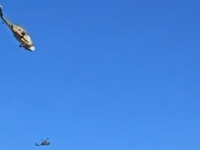Lebanese Prime Minister Rafiq Hariri's efforts to project an image of political stability in order to attract foreign investment and pull the country out of its deep economic crisis have run into trouble.
Hariri is being stymied by differences with the Shiite fundamentalist group Hezbollah, whose guerrilla campaign against Israel led to the Jewish state ending its 22-year occupation of southern Lebanon last May.
Last week, Hezbollah launched a cross-border attack on an Israeli army patrol, killing one soldier and wounding two others, in its pursuit of Lebanese claims to further Israeli-held territory.
Only the day before, Hariri, in France on an official visit, gave an undertaking that Lebanon and its dominant neighbor Syria, a patron of Hezbollah, would do nothing to provoke Israel along the border.
"Our policy is clear, and we are in agreement on this subject with Syria: there will be no provocations from our side because we seek security and peace," he said. He was trying to persuade French investors to show an interest in his country, whose economy has been languishing for the past two years.
The Hizbollah attack drew a sharp response from Israel, with caretaker Prime Minister Ehud Barak saying Israel held Beirut and Damascus responsible for the incident. Hizbollah said it carried out the attack to mark "the week of homage to the martyrs of the Lebanese Islamic Resistance," or Hizbollah's military wing.
But Hariri said Monday that resistance to Israel should not be "monopolized" by any single party. "The resistance is not the monopoly of anyone," the Lebanese prime minister said in a statement issued by his office, then mysteriously withdrawn after meeting two Hizbollah leaders.
Immediately following the attack, Hizbollah went on the diplomatic offensive as well. Its leader, Sheikh Hassan Nasrallah, denounced what he said was pressure on the country by the United States.
US ambassador to Lebanon David Sutterfield had condemned the Hezbollah attack, warning that continued raids would scare away investors from Lebanon's struggling economy. "We don't understand how such attacks can serve any interests other than that of escalation and provocation," Sutterfield said. Such operations "will have a negative impact on the flow of investment towards Lebanon where there is a need to create a stable economic situation," he added.
Hariri's short-lived statement Monday was widely commented on in Tuesday's Lebanese press. According to the As-Safir daily, which is close to the Syrian leadership, "the statement has set out in broad daylight the political conflict and the differences between Hariri and the Hizbollah."
The liberal An-Nahar daily said "Hariri's plan is very clear: it is aimed at saying that his government has its own program that the parties concerned cannot ignore." "Sources close to Hariri say Nasrallah's statements will have a negative impact on the efforts of the government, which is seeking to strengthen confidence both within and outside the country, and on the financial markets," it added.
Lebanon lost its position as a regional economic center known as the "Switzerland of the Middle East" with the onset of its ferocious 15-year civil war in 1975.
On his return to power in October after a two-year hiatus, Hariri made a thorough shake-up of the country's economy a priority through privatizations, opening up to competition and signing an association treaty with the European Union.
But the slide has not stopped. Public debt has climbed to nearly $25 billion, or 147 percent of gross domestic product, and rumors have started circulating that the Lebanese pound would be devalued, despite denials from Finance Minister Fuad Siniora.
The question of stability is further underlined by the recent election as Israel's prime minister of right-wing hawk Ariel Sharon, a man widely feared as being more likely than his predecessor to use violence to counter violence.
"In short, if something is not done to provide reassurance, the economic program could quickly come off the rails," a banker who asked not to be identified told AFP. — (AFP, Beirut)
by Pascal Mallet
© Agence France Presse 2001
© 2001 Mena Report (www.menareport.com)








